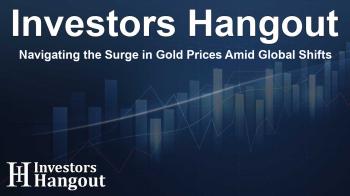Navigating the Surge in Gold Prices Amid Global Shifts

A New Perspective on Gold's Price Surge
Gold has been at the forefront of investor discussions, recently reaching an unprecedented high. This surge stems not just from market speculations but also signifies deeper global tensions, particularly related to the shifting power dynamics between major nations.
Gold's Breakout Performance and Investor Strategies
In recent analyses, gold has successfully broken past critical resistance levels. Investors are keenly observing this breakout, as a sustained upward trend could see prices climb to $4000 per ounce. The current economic climate has heightened interest in gold, traditionally viewed as a safe haven in times of uncertainty.
Understanding the Factors Influencing Gold Prices
The rise in gold prices can be attributed to several interlinked issues, most notably the geopolitical maneuverings involving China, Russia, and India. These nations have demonstrated a coordinated front that underscores their desire to reshape the global order, positioning themselves as counterbalances to U.S. hegemony.
A Historical Shift in Central Bank Holdings
Notably, for the first time in decades, central banks are holding more gold than U.S. Treasuries. This shift not only reflects a strategic move to enhance their reserves but also indicates a growing skepticism of U.S. financial stability. As nations diversify their assets, gold's value as a cornerstone in their portfolios becomes increasingly vital.
The Influence of Rising Yields on Investment Decisions
As global bond yields rise, particularly in European markets, the repercussions are being felt across the Atlantic as well. U.S. markets are reacting as investors reassess risks and returns amidst these changes. The correlation between rising yields and stock market performance is becoming evident, requiring investors to adapt their strategies accordingly.
Long-Term Investment Considerations
For those invested in the market, maintaining solid long-term positions remains crucial. Investors are advised to consider protective strategies such as hedging with cash or Treasury bills. By balancing high-risk assets with more stable investments, they can position themselves effectively for both potential downturns and market rallies.
The Role of Passive Investment Approaches
This period of uncertainty has also seen a significant influx of what is termed 'blind money' into equity markets. This type of investment, characterized by a lack of analysis in favor of simpler strategies, often follows general market trends rather than specific indicators.
Market Trends and Future Implications
As upcoming reports, such as the ISM Manufacturing Index, are anticipated, market participants will be keenly observing these metrics for insights into economic health. The market landscape is evolving, and investors must remain agile and informed to navigate these developments.
Strategies for a Balanced Portfolio
For those adhering to conventional portfolio strategies, focusing on high-quality bonds of shorter durations may yield better results given the current economic climate. Employing ETFs as tactical positions rather than long-term commitments can also enhance investment agility.
Conclusion: Adapting to the New Normal
As the global financial landscape continues to shift, notably witnessing a reconfiguration of power among major economies, gold's significance is more pronounced than ever. Investors should remain vigilant, adapting to changing market conditions while maintaining a diversified approach to asset management.
Frequently Asked Questions
Why is gold hitting an all-time high?
Gold is surging due to geopolitical tensions and shifts in global power dynamics, particularly involving nations like China, India, and Russia.
How are rising yields impacting the stock market?
Increasing yields are causing investors to reassess risk, leading to selling pressures in equities as they seek safer investments.
What does a central bank's shift to gold mean?
Central banks prioritizing gold over U.S. Treasuries indicates a strategic move towards asset diversification and growing skepticism towards U.S. financial stability.
What investment strategies are recommended during these fluctuations?
Investors are advised to consider protective hedges, diversified portfolios, and tactical investments to navigate market volatility effectively.
What is 'blind money' in the stock market?
'Blind money' refers to passive investments flowing into the market without thorough analysis, often driven by market trends rather than fundamentals.
About The Author
Contact Evelyn Baker privately here. Or send an email with ATTN: Evelyn Baker as the subject to contact@investorshangout.com.
About Investors Hangout
Investors Hangout is a leading online stock forum for financial discussion and learning, offering a wide range of free tools and resources. It draws in traders of all levels, who exchange market knowledge, investigate trading tactics, and keep an eye on industry developments in real time. Featuring financial articles, stock message boards, quotes, charts, company profiles, and live news updates. Through cooperative learning and a wealth of informational resources, it helps users from novices creating their first portfolios to experts honing their techniques. Join Investors Hangout today: https://investorshangout.com/
The content of this article is based on factual, publicly available information and does not represent legal, financial, or investment advice. Investors Hangout does not offer financial advice, and the author is not a licensed financial advisor. Consult a qualified advisor before making any financial or investment decisions based on this article. This article should not be considered advice to purchase, sell, or hold any securities or other investments. If any of the material provided here is inaccurate, please contact us for corrections.

